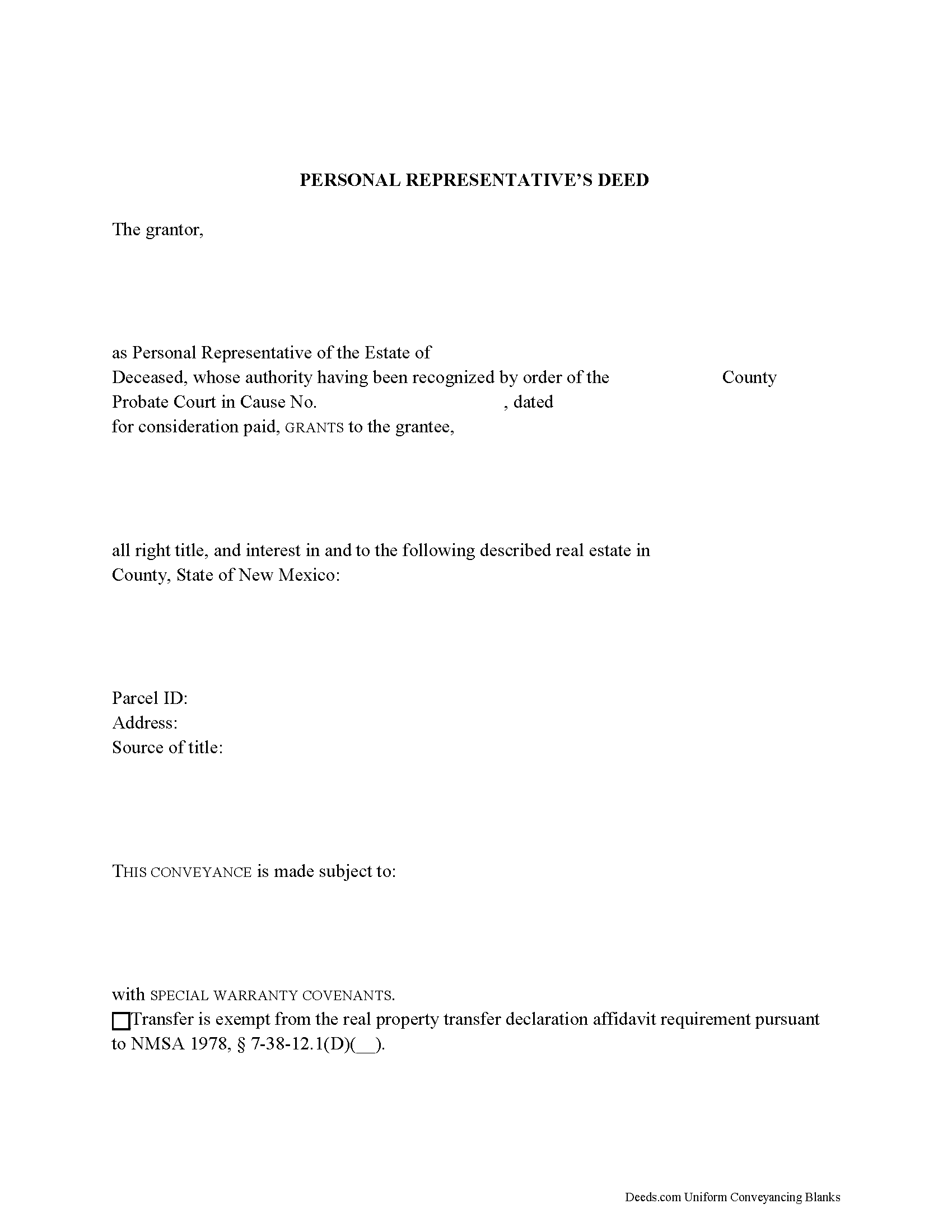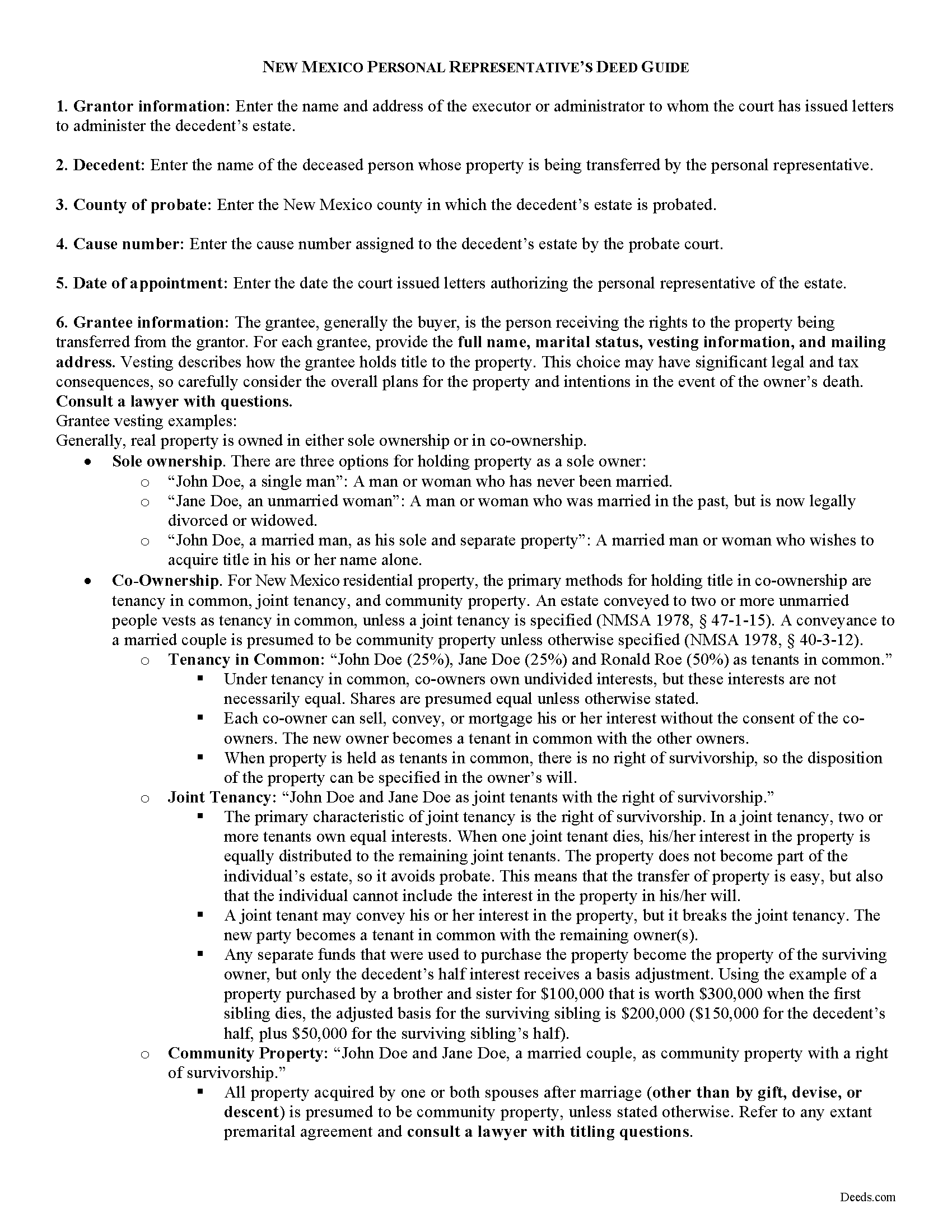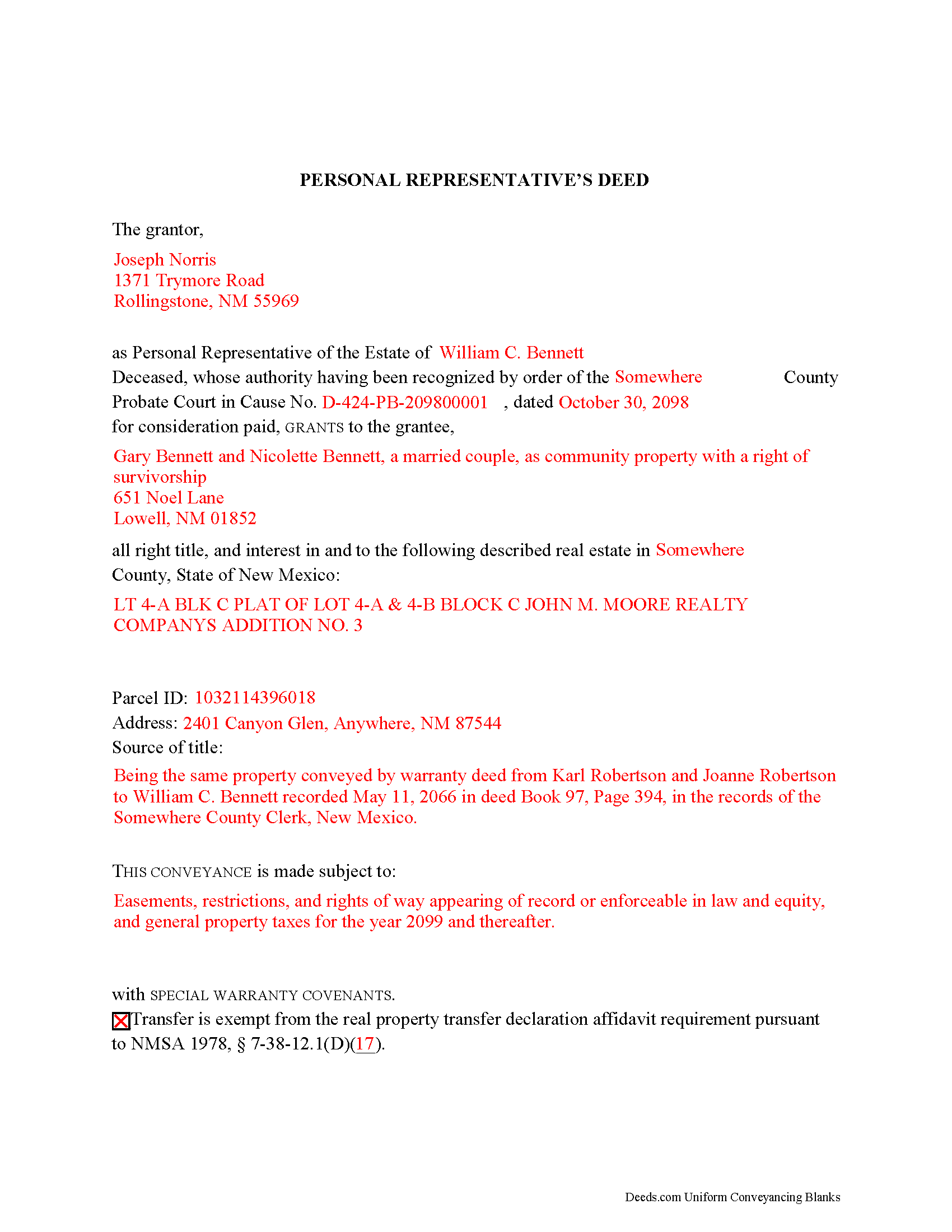De Baca County Personal Representative Deed Form

De Baca County Personal Representative Deed Form
Fill in the blank form formatted to comply with all recording and content requirements.

De Baca County Personal Representative Deed Guide
Line by line guide explaining every blank on the form.

De Baca County Completed Example of the Personal Representative Deed Document
Example of a properly completed form for reference.
All 3 documents above included • One-time purchase • No recurring fees
Immediate Download • Secure Checkout
Additional New Mexico and De Baca County documents included at no extra charge:
Where to Record Your Documents
De Baca County Clerk
Fort Sumner, New Mexico 88119
Hours: 8:00am to 12:00 & 1:00 to 4:30pm M-F
Phone: (575) 355-2601
Recording Tips for De Baca County:
- Documents must be on 8.5 x 11 inch white paper
- Recorded documents become public record - avoid including SSNs
- Check margin requirements - usually 1-2 inches at top
Cities and Jurisdictions in De Baca County
Properties in any of these areas use De Baca County forms:
- Fort Sumner
- Taiban
- Yeso
Hours, fees, requirements, and more for De Baca County
How do I get my forms?
Forms are available for immediate download after payment. The De Baca County forms will be in your account ready to download to your computer. An account is created for you during checkout if you don't have one. Forms are NOT emailed.
Are these forms guaranteed to be recordable in De Baca County?
Yes. Our form blanks are guaranteed to meet or exceed all formatting requirements set forth by De Baca County including margin requirements, content requirements, font and font size requirements.
Can I reuse these forms?
Yes. You can reuse the forms for your personal use. For example, if you have multiple properties in De Baca County you only need to order once.
What do I need to use these forms?
The forms are PDFs that you fill out on your computer. You'll need Adobe Reader (free software that most computers already have). You do NOT enter your property information online - you download the blank forms and complete them privately on your own computer.
Are there any recurring fees?
No. This is a one-time purchase. Nothing to cancel, no memberships, no recurring fees.
How much does it cost to record in De Baca County?
Recording fees in De Baca County vary. Contact the recorder's office at (575) 355-2601 for current fees.
Questions answered? Let's get started!
Transferring a Decedent's Realty in New Mexico
Probate is the court-supervised process of settling a decedent's (deceased person's) estate and distributing his or her assets according to the provisions of a will or pursuant to laws of intestate succession.
New Mexico is one of 18 states as of the time of this writing to adopt the Uniform Probate Code, a nationally-recommended set of laws governing the probate process. The Uniform Probate Code is codified at Chapter 45 of the New Mexico Statutes.
Probate of an estate takes place in the probate court of the New Mexico county wherein the decedent resided at the time of death. Contested cases may be brought before the district court.
When a decedent leaves property titled in his or her name individually, such property is subject to probate. Any realty the decedent held as a tenant in common must also pass through probate. If the decedent's estate includes realty not situated in the county where the estate is administered, NMSA 1978, 45-1-404 provides that a notice of administration be filed in the county wherein any ancillary real property is situated.
The Uniform Probate Code also addresses non-probate transfers of property (codified in New Mexico at NMSA 1978, 45-6-101 through 45-6-417). Property held with a survivorship interest, in a trust, or with a beneficiary designation (such as a recorded transfer on death deed) transfers outside of probate. A surviving spouse in New Mexico who occupied a homestead as community property with his/her spouse may also avoid probate by filing an affidavit of transfer of title to homestead under NMSA 1978, 45-3-1205.
The first step of probate is making application for appointment as personal representative (PR), who is the fiduciary in charge of settling and distributing the estate; administration of the estate cannot begin until the court authorizes a personal representative.
Depending on the testacy status of the decedent (whether the decedent died with a will), the personal representative may alternately be referred to as an executor or an administrator. An executor is someone named by the decedent to carry out the provisions of his or her will, while an administrator is a person selected by the probate court when the decedent dies without a will or the will does not name an executor of the estate.
NMSA 1978, 45-3-203 establishes the priority of persons to be appointed PR of a decedent's estate, with the executor named in the decedent's will having highest priority. If the decedent died without a will, the surviving spouse has the highest priority to serve, followed by the intestate decedent's heirs. A person petitioning the court to serve as an estate's administrator must obtain waivers from each person with a higher priority to serve, if applicable.
To officially begin administration, the court issues letters appointing the PR. When the decedent dies intestate (without a will), these are called letters of administration. When the decedent dies testate (with a will), these are called letters testamentary. The letters act as proof that the personal representative named within is the acting and qualified PR, enabling him to act on behalf of the decedent's estate and carry out the duties of administration.
The Uniform Probate Code establishes rules for providing notice to heirs and creditors of a probated estate. Once appointed, the PR must provide notice of appointment to heirs and devisees within 10 days (NMSA 1978, 45-3-705). A devisee (or beneficiary) is anyone listed in the decedent's will to receive assets from the estate. An heir is anyone entitled to an intestate decedent's property. Statutes also require the PR to provide notice to creditors to file claims on the estate within 4 months of the publication of such notice (45-3-801).
Among a PR's duties is to collect the decedent's assets and take inventory of the estate; file applicable income and estate taxes; pay the decedent's debts and the costs of estate administration; and, finally, distribute the remaining assets to the heirs or devisees. The allotted shares of heirs in an intestate estate are outlined at NMSA 1978, 45-2-101 through 45-2-104.
The PR may have to petition the district court to partition an estate when multiple heirs or devisees are entitled to undivided interests in realty. The court may make partition or direct the PR to sell property that "cannot be partitioned without prejudice...and which cannot conveniently be allotted to any one party" (NMSA 1978, 45-3-911).
In New Mexico, a PR deed is an instrument that conveys title from the decedent to a devisee, heir, or purchaser, typically with special warranty covenants. The special warranty deed is a statutory form in New Mexico, codified at NMSA 1978, 47-1-44(5). By offering a fiduciary deed with special warranty covenants, the PR covenants with the grantee that the premises conveyed are free from encumbrances made by the grantor, and that the grantor will warrant and defend the grantee's title against the lawful claims arising by, through, or under the grantor, but against no other persons (47-1-38).
To successfully distribute real property to successors in interest, whether they be devisees listed in the decedent's will or heirs entitled by laws of intestate succession, the PR must confirm the successor's title through executing and recording a personal representative's deed. Some title companies may require that a court order be entered before transferring a decedent's property.
When the grantee is an heir or devisee and the conveyance is made with no consideration, the PR deed may be alternately referred to as a deed of distribution. The deed, recorded in the clerk's office wherein the subject realty is located, serves as "conclusive evidence that the distributee has succeeded to the interest of the estate in the distributed assets, as against all interested persons" (NMSA 1978, 45-3-908). An interested person is an heir, devisee, or other beneficiary or creditor having a property right in or a claim against the decedent's estate (45-1-201(26)).
A PR deed names the authorized executor or administrator of the estate as the grantor, along with details about the probated estate, including the decedent's name, the county of probate, the cause number assigned to the estate by the probate court, and the PR's date of appointment. As with other transfers of real property, it requires the grantee's name, address, and vesting information, and contains a complete legal description of the subject parcel, along with parcel identifier, and a recitation of the source of title. Detail any restrictions or agreements associated with the premises. Whether the PR executes the deed to a distributee or to a purchaser, the instrument must comply with New Mexico's standards for form and content of instruments pertaining to interests in realty. The authorized personal representative must sign in the presence of a notarial official before recording the deed in the appropriate county clerk's office.
Because New Mexico is a nondisclosure state, certain types of personal information, including the consideration exchanged in a transfer of property, are withheld from public record. Most transfers require a Real Property Transfer Declaration Affidavit, which details the relevant sales information. This affidavit must be filed with the assessor's office within 30 days of recording the deed. If the deed conveys title to a purchaser, include a statement of consideration paid for the transfer and an accompanying New Mexico real property transfer declaration affidavit. Note that transfers made to effect a court-ordered partition or establish a distribution from an estate are exempt from the affidavit requirement (NMSA 1978, 7-38-12.1(D)).
The information provided here is not a substitute for legal advice. Consult an attorney with questions regarding personal representative's deeds and probate procedures in New Mexico, as each situation is unique.
(New Mexico PRD Package includes form, guidelines, and completed example)
Important: Your property must be located in De Baca County to use these forms. Documents should be recorded at the office below.
This Personal Representative Deed meets all recording requirements specific to De Baca County.
Our Promise
The documents you receive here will meet, or exceed, the De Baca County recording requirements for formatting. If there's an issue caused by our formatting, we'll make it right and refund your payment.
Save Time and Money
Get your De Baca County Personal Representative Deed form done right the first time with Deeds.com Uniform Conveyancing Blanks. At Deeds.com, we understand that your time and money are valuable resources, and we don't want you to face a penalty fee or rejection imposed by a county recorder for submitting nonstandard documents. We constantly review and update our forms to meet rapidly changing state and county recording requirements for roughly 3,500 counties and local jurisdictions.
4.8 out of 5 - ( 4578 Reviews )
Dianne J.
August 25th, 2020
Happy to give you a 5 star rating. We have never been a position to get changes on and record our own deed. You made the process very easy. Submitted my forms on a Friday, made one correction that was requested of me, paid our fees and the received notification of deed being recorded the next Tuesday. Wonderful work on your part and super easy for me. Thanks!
Thank you for your feedback. We really appreciate it. Have a great day!
Della M.
July 7th, 2019
Very easy to purchase with immediate use of all of the forms that you need for probate of property. My parents had died and left equal shares of their home to my 2 brothers and I.
Thank you!
Duane L.
September 5th, 2020
Easy to use with very helpful directions.
Thank you!
jon m.
November 7th, 2019
Great last minute forms saved me a critical time when I had no access to my own resources. Five Star Customer service.
We appreciate your business and value your feedback. Thank you. Have a wonderful day!
AHMED E.
August 23rd, 2019
5 stars
Thank you!
Sylvia H.
December 20th, 2023
I appreciated the fact that all the forms I needed were available, and even some I don't need right now but will need in the future (homestead exemption) were also available. And the price is very good. Thank you
Your kind words have brightened our teams day! Thank you for the positive feedback.
Susie k.
March 3rd, 2020
No complaints
Thank you!
Clifford A.
April 6th, 2023
Very efficient and smooth process. Thank you!
Thank you!
Angelique A.
December 27th, 2018
Very helpful and quick customer service. Highly recommended
Thank you for your feedback Angelique, we appreciate you. Have a great day!
mary c.
May 24th, 2022
Really good product, included guide to filling out forms. Totally pleased with that part. Customer service however was terrible. Did not hear back after I sent two emails. The site signed me up but after I was accepted they would not allow me to download a form, with the notation my account was closed. Had to use another email. Had problems with that. Finally got off of site and went to a login site that allowed me to download the forms. If you can get past setting up your account, it is fantastic site. Nice price compared to alternatives. Also I recieved two validation codes. Have no idea why they were sent.
Thank you!
Garrett R.
May 24th, 2022
I am a real estate attorney in CA. These Wyoming model deeds look too basic and barely adequate: no usual name and address at the top for tax statements and who recorded it. Some old fashioned legalese that only obfuscates. I won't use them. Your background info was good though.
Thank you for your feedback. We really appreciate it. Have a great day!
Kenneth H.
January 9th, 2020
Easy download, informative examples. Very good experience.
We appreciate your business and value your feedback. Thank you. Have a wonderful day!
JAMES V.
August 5th, 2020
I initiated an order at 8:30PM on a Tuesday. I already had a response waiting for me when I opened my email the next morning. Very responsive. I'm very happy with this service.
We appreciate your business and value your feedback. Thank you. Have a wonderful day!
Tram V.
November 8th, 2021
This is quick, easy, and very reasonably priced. I wish I found this site before doing my living trust. I had the company who does my trust do the transfer deed and they charged an additional $329 for the deed alone.
Thank you for your feedback. We really appreciate it. Have a great day!
LEON S.
November 16th, 2019
recorded deed space to small for corrective deed requirement
Thank you for your feedback. We really appreciate it. Have a great day!